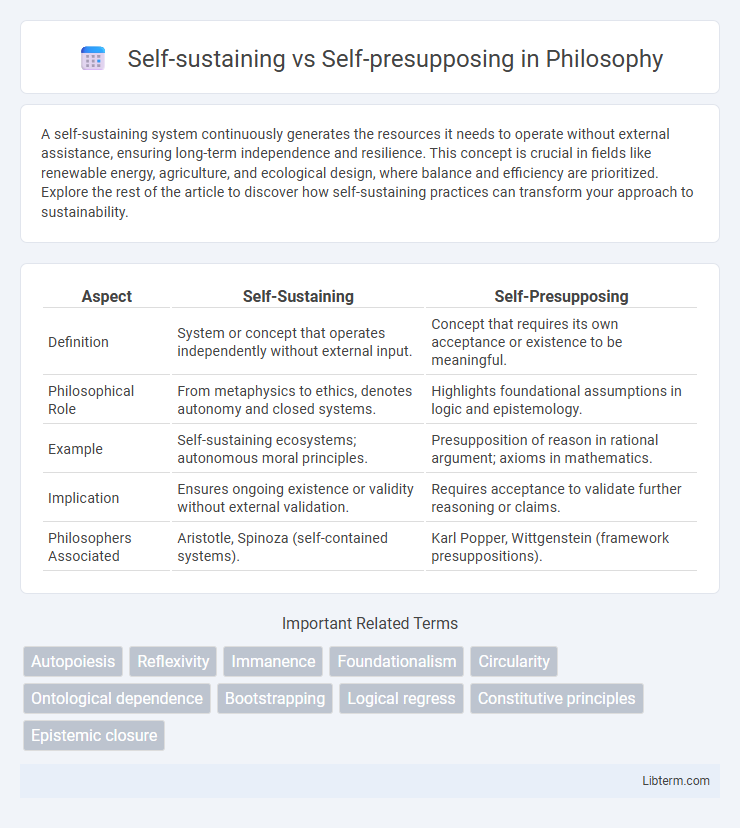A self-sustaining system continuously generates the resources it needs to operate without external assistance, ensuring long-term independence and resilience. This concept is crucial in fields like renewable energy, agriculture, and ecological design, where balance and efficiency are prioritized. Explore the rest of the article to discover how self-sustaining practices can transform your approach to sustainability.
Table of Comparison
| Aspect | Self-Sustaining | Self-Presupposing |
|---|---|---|
| Definition | System or concept that operates independently without external input. | Concept that requires its own acceptance or existence to be meaningful. |
| Philosophical Role | From metaphysics to ethics, denotes autonomy and closed systems. | Highlights foundational assumptions in logic and epistemology. |
| Example | Self-sustaining ecosystems; autonomous moral principles. | Presupposition of reason in rational argument; axioms in mathematics. |
| Implication | Ensures ongoing existence or validity without external validation. | Requires acceptance to validate further reasoning or claims. |
| Philosophers Associated | Aristotle, Spinoza (self-contained systems). | Karl Popper, Wittgenstein (framework presuppositions). |
Understanding Self-Sustaining Systems
Self-sustaining systems operate independently by continuously maintaining their structure and functions through internal processes without reliance on external inputs, which contrasts with self-presupposing systems that depend on pre-existing conditions or assumptions for their operation. In ecological and technological contexts, self-sustaining systems exhibit resilience by adapting to changes while preserving core functions, exemplified by closed-loop ecosystems and autonomous machines. Understanding these systems involves analyzing feedback mechanisms, resource cycles, and energy flows that enable ongoing autonomy and stability over time.
Defining Self-Presupposing Concepts
Self-presupposing concepts inherently rely on prior understanding or assumptions embedded within their definitions, distinguishing them from self-sustaining concepts that exist independently without external prerequisites. Defining self-presupposing concepts involves identifying the underlying assumptions that must be accepted before the concept can be meaningfully applied or analyzed. This approach is crucial in semantic analysis, philosophy of language, and cognitive science, where recognizing these presuppositions helps clarify how meaning and knowledge are constructed.
Key Differences Between Self-Sustaining and Self-Presupposing
Self-sustaining systems maintain their operation without external inputs, relying on internal feedback loops and resources to persist over time. In contrast, self-presupposing systems depend on the prior existence of certain conditions, assumptions, or knowledge to function and cannot operate independently. Key differences include the independence of self-sustaining systems from external premises, whereas self-presupposing systems inherently require foundational premises for their validity or existence.
Philosophical Foundations of Self-Sustaining
Self-sustaining systems maintain their existence through internal processes without relying on external assumptions, highlighting autonomy in ontological frameworks. Philosophical foundations of self-sustaining emphasize self-reference and circular causality, which contrast with self-presupposing systems that depend on pre-established conditions or external validation. Key thinkers like Heidegger and Maturana explore how self-sustaining entities enact their being, grounding their philosophy in concepts of autopoiesis and existential integrity.
Logical Structure of Self-Presupposing Ideas
Self-presupposing ideas rely on prior concepts within their logical structure, creating a dependency that can lead to circular reasoning or foundational assumptions. In contrast, self-sustaining ideas maintain coherence and justification independently, ensuring that their logical framework does not require external validation. Analyzing the logical structure of self-presupposing ideas reveals the challenges in establishing objective truth without infinite regress or arbitrary axioms.
Real-World Examples: Self-Sustaining vs Self-Presupposing
Self-sustaining systems operate independently, such as the Earth's natural ecosystems that recycle nutrients and energy without external inputs. Self-presupposing systems, like language or social institutions, rely on pre-existing frameworks and shared understanding to function effectively. Real-world examples include a solar-powered water purification plant (self-sustaining) and legal systems dependent on established laws and norms (self-presupposing).
Implications in Epistemology
Self-sustaining beliefs derive justification independently, forming a foundational basis in epistemology, while self-presupposing beliefs rely on their own acceptance to establish validity, often leading to circular reasoning. The distinction impacts theories of knowledge by challenging the criteria for justified belief and the structure of epistemic justification. Understanding this difference is crucial for addressing issues of skepticism and the coherence of knowledge systems.
Applications in Artificial Intelligence and Systems Theory
Self-sustaining systems in artificial intelligence operate independently by continuously generating their own resources and inputs, enabling autonomous functionality in dynamic environments. In contrast, self-presupposing systems rely on predefined assumptions or initial conditions, which guide their operations but limit adaptability and resilience to unforeseen changes. Applications in systems theory emphasize designing self-sustaining AI models for robust, long-term deployment, whereas self-presupposing frameworks often suit controlled or well-defined domains with stable parameters.
Common Misconceptions and Clarifications
Self-sustaining systems operate independently without relying on external assumptions, maintaining stability through internal processes, whereas self-presupposing systems depend on foundational assumptions to function. A common misconception is that self-presupposing systems are inherently unstable, but they can be robust if their presuppositions are consistent and well-defined. Clarifications emphasize that self-sustaining does not imply complete isolation, as subtle inputs may still influence the system, differentiating it from purely self-presupposing frameworks grounded in axiomatic beliefs.
Choosing Between Self-Sustaining and Self-Presupposing Frameworks
Choosing between self-sustaining and self-presupposing frameworks hinges on the desired level of foundational autonomy versus dependency on prior assumptions. Self-sustaining frameworks operate independently by generating justification internally, enhancing robustness in argumentation or theory-building. In contrast, self-presupposing frameworks rely on certain accepted principles, facilitating efficiency and coherence when those foundational elements are widely recognized and uncontested.
Self-sustaining Infographic

 libterm.com
libterm.com